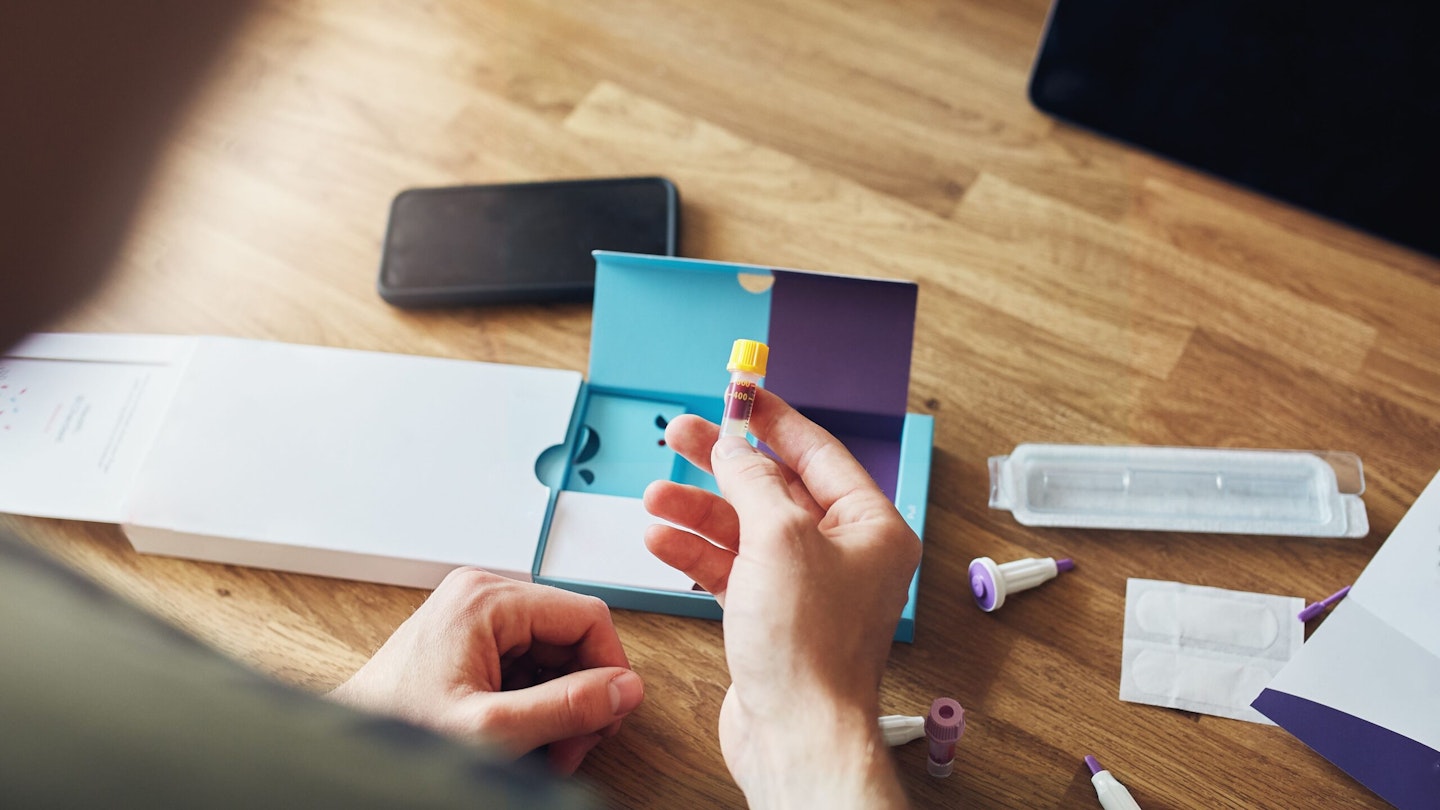In an effort to increase the number of women taking up smear tests, the NHS is going to start rolling out home testing kits, after a successful trial which saw 56% of participants returning a sample. However, it’s not only at-home smear testing kits making their way to the market, as home health testing kits are now available to detect STIs, food intolerances and menopause. Available to buy in pharmacies and online, it's now easier than ever to do a test, pop it in the post, and wait for the results.
With the NHS under continued strain, home health testing kits seem like a good way of monitoring your own health. Results are sent direct to your door and will likely inform you whether you need to then see a GP or not. But how reliable are the results and – more importantly – are home health testing kits safe to use? Aamina Rafiq, Responsible Pharmacist at Simple Online Pharmacy answers the most common questions surrounding home health testing kits below.
Are home health testing kits safe?
“When used according to the manufacturer's instructions, home health test kits are generally considered safe, as they are designed to be easy to use and minimise the risk of harm to the user,” Aamina says. “Fitness and nutrition tests usually involve non-invasive testing, like hair or saliva samples, and menopause testing is usually done on urine samples, which is also safe and non-invasive. Allergy and intolerance testing often requires a finger prick blood sample - which might be uncomfortable for some but is safe.”
Are home health test kits accurate?
Aamina says: "The accuracy can vary based on the type of test, and the user. Higher quality kits tend to be more accurate, but any test can have its results affected by user error, like a sample being collected incorrectly or badly handled. While home health testing kits are useful, we would always recommend that if you have a serious health concern you consult a medical practitioner such as your GP.
Home tests like pregnancy tests have high accuracy rates, at 98-99%, when used as instructed. Home menopause tests can detect FSH (hormone levels) approximately 90% of the time, but this doesn't necessarily accurately give the whole picture or diagnose menopause.”
Can we trust the labs that process the home kits?
Laboratories that process the home health testing kits can be trusted, as they must adhere to strict regulations. “Safety, accuracy, and reliability of home health test kits are governed by strict regulations,” Aamina explains. “The Medicines and Healthcare products Regulatory Agency (MHRA) is responsible for ensuring that medical devices, including home test kits, meet safety and performance standards, and United Kingdom Accreditation Service (UKAS) evaluates and accredits laboratories to make sure they meet international standards.”

When testing for perimenopause or menopause should we rely on home health test kits at all?
Menopause can be a bit of a minefield! If you’re getting symptoms of perimenopause such as irregular periods, hot flushes, brain fog or night sweats, you might decide to get a home health testing kit to see what’s happening with your hormone levels. While this could give an indication of what your body is doing, it may not be wholly accurate, as Aamina explains.
“Home perimenopause and menopause tests measure follicle-stimulating hormone (FSH) levels, either via urine, saliva, or blood samples. Elevated FSH levels suggest that the ovaries aren't responding well to the hormone, which can indicate perimenopause or menopause. However, FSH levels can fluctuate for a variety of reasons, from what stage of the menstrual cycle you're at, to hormonal birth control, and conditions like polycystic ovary syndrome (PCOS) or thyroid disorders. This means the tests might not be entirely accurate, and you should discuss your results with your doctor.”
Once you've spoken with a menopause specialist or your doctor, you can begin to manage your symptoms in a way that suits you. This might be taking a menopause supplement, or considering HRT.
Are there other ways to test for menopause aside from home health tests?
“No single test can diagnose menopause on its own, so it's important to confirm results of home tests with blood tests ordered by your doctor, as well as physical exams and evaluation of your symptoms.”
Should we rely on doctors and medical experts instead?
“Doctors can provide a more comprehensive evaluation, including your medical history and symptoms, as well as the results of your tests, and they'll also be able to monitor and manage any issues related to the menopause,” Aamina says.
While home health testing kits can undeniably be useful and are considered safe, for the most accuracy and to discover the best course of treatment for most conditions, talking to your GP or other healthcare professional, such as a nurse, is the best route to take.
Aamina Rafiq is the Responsible Pharmacist and one of the Senior Managers within the Clinical Team at Simple Online Pharmacy. Having gained her Master of Pharmacy degree at Strathclyde University she worked in multiple pharmacies across Scotland before joining the team at Simple Online Pharmacy in 2018. She prioritises patient safety, ensuring it is at the forefront of all decisions made at Simple.
Becky Fuller is a senior digital writer for Yours.co.uk. She is also a fully qualified personal trainer and strength coach, specialising in fitness and wellbeing for over 50s. Prior to joining Yours, Becky was a fitness writer for Saga, and a freelance entertainment and theatre journalist. Becky is passionate about helping people to move well and discover the many benefits of strength training.
